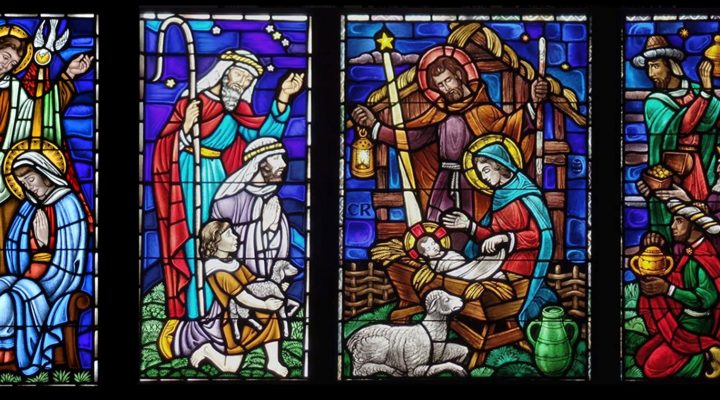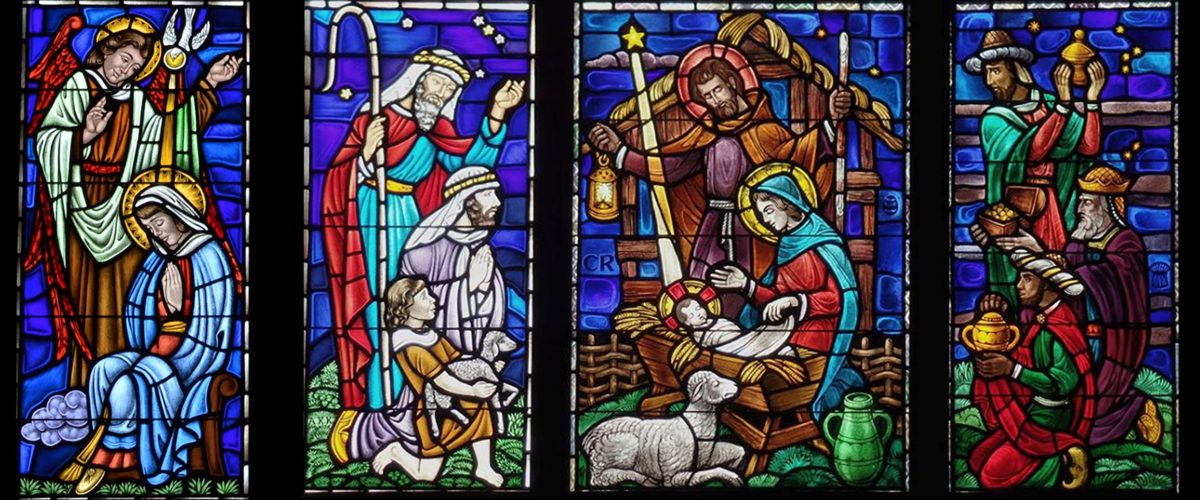The Holy Spirit appears next at the fringes of the temple, in the world of widows and old men and peasants from Galilee. Luke describes the old man with unusually lavish language, including three rapid-fire references to the Spirit.
Now there was a man in Jerusalem whose name was Simeon; this man was righteous and devout, looking forward to the consolation of Israel, and the holy spirit rested on him. It had been revealed to him by the holy spirit that he would not see death before he had seen the Lord’s messiah. Guided by the spirit, Simeon came into the temple. (Luke 2:25–27).
Invisible to the powers-that-be, Simeon is inspired. Three-times inspired. The Spirit rests upon him. The Spirit reveals to him. The Spirit guides him.
What he says as the result of the inspiration is surprising only to those who have failed to read what preceded Simeon’s story in the Gospel of Luke. When Simeon sees the peasants’ child, he lifts the baby in his arms and praises God in words known to the church as the nunc dimittis:
Lord, now lettest thou thy servant depart in peace
according to thy word.
For mine eyes have seen thy salvation,
Which thou hast prepared before the face of all people;
To be a light to lighten the Gentiles and to be the glory of thy people Israel. (Luke 2:28–32, KJV)
“This prayer, too, drips with the Old Testament.”
Like every canticle, every promise, every prediction about John the Baptist and Jesus, this prayer, too, drips with the Old Testament. Simeon’s song, although it seems extemporaneous and unplanned, is in fact deliberately suffused with the dream of the Old Testament — Isaiah 40 through 55 to be exact. If his song were a jigsaw puzzle, and every phrase of it a separate piece, we would likely discover that each piece of the puzzle is a snippet of Isaiah 40 through 55. Take those phrases away and, like Gabriel’s promise to Zechariah, there would be nothing left to hold.
This is not surprising. Simeon has waited for the comforting — the consolation — of Israel. This is a shorthand reminder of Isaiah 40:1-2, which begins, “Comfort, O comfort my people, says your God.” Simeon, like Zechariah and the angel before him, understands that the advent of the baby is the inauguration of the liberation that this ancient prophet had anticipated. Simeon’s belief that Jesus will be “a light for revelation to the nations” stems from Isaiah 42:6, “I have given you as … a light to the nations” (Isaiah 49:6, as well). Even Simeon’s belief that Jesus comes “for glory to your people Israel” echoes Isaiah 46:13: “I will put salvation in Zion, for Israel my glory.”
Simeon’s private words to Mary, “This child is destined for the falling and the rising of many in Israel, and to be a sign that will be opposed” also grows from the soil of Isaiah 40 through 55. Opposition will be the hallmark of the child’s destiny. He will become, in short, the servant, the suffering servant, whose uncompromising expansion of God’s reign to all nations — not just Israel — leads the servant to personal anguish (Isaiah 42:2-3), the torment of having his beard torn out (50:6) and his back beaten (53:4-5, 7), and to an early, ignominious death (53:7-12).
“With the inspiration of the Holy Spirit, Simeon captures the majesty of Jesus’ ministry.”
With the inspiration of the Holy Spirit, Simeon captures the majesty of Jesus’ ministry — he will be a light to the nations — and the misery of his death, like the servant long before him. This is a remarkable perception, a truly astute — Luke would say inspired — observation about Jesus’ destiny, a destiny that would thrust a sword through Mary’s soul.
When we realize that Simeon’s song is a collage of words and ideas originally lodged in Isaiah 40 through 55, we learn something important about the Holy Spirit. Simeon, who receives guidance and revelation because the Spirit rests on him, is a figure of epic inspiration. We know nothing else about him — except that he was a student of the book of Isaiah.
Simeon is ripe to lift this peasant son in his arms because the whole of his being is saturated by the prophetic vision of Isaiah 40 through 55. Simeon is inspired, in other words, because he is vigilant, because he is regular in devotion, and because he has studied the poignant prophecies of Isaiah, which he now sees taking shape in a small Galilean boy who will be a light to the nations, who will offer salvation to all the world’s peoples.
If the stories surrounding Jesus’ birth in Luke’s Gospel teach nothing else, it is that an experience of the Holy Spirit rises from regular devotion, with an eye toward that single significant moment when all that has been learned will come together in the dazzling, long-awaited, yet still unexpected salvation of God, as surprising as a Nazarene baby carried to the temple, two turtle doves in tow, by his peasant parents.
 Jack Levison holds the W.J.A. Power Chair of Old Testament Interpretation and Biblical Hebrew at Perkins School of Theology at Southern Methodist University. He is known for his groundbreaking work on the Holy Spirit and topics both biblical and theological. This column is excerpted from his book An Unconventional God. Used here with permission of Baker Publishing, © 2020.
Jack Levison holds the W.J.A. Power Chair of Old Testament Interpretation and Biblical Hebrew at Perkins School of Theology at Southern Methodist University. He is known for his groundbreaking work on the Holy Spirit and topics both biblical and theological. This column is excerpted from his book An Unconventional God. Used here with permission of Baker Publishing, © 2020.
Also in this Advent series:
Advent reflection: An infinity of grace
Advent reflection: The advent of liberation
Advent reflection: The genesis of Jesus
Advent reflection: Holy eruption
Advent reflection: A burst of inspired blessing
Advent reflection: An explosive conversation
Advent reflection: The shadow of the Spirit


